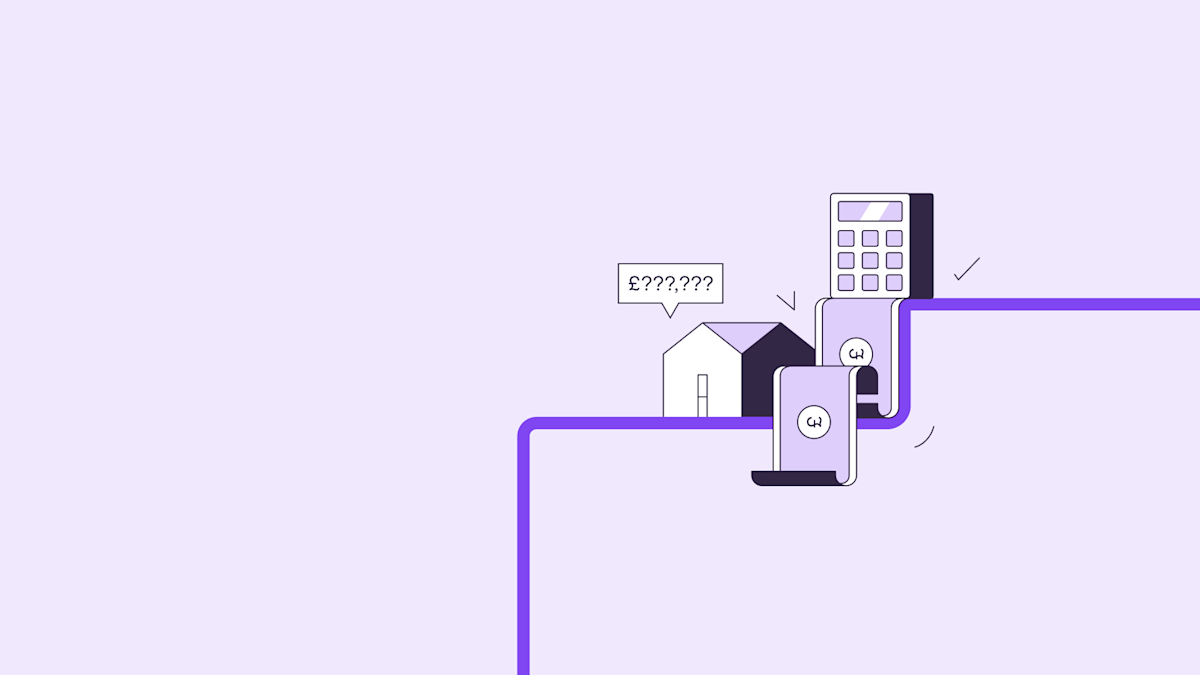This guide explains the difference between leasehold and freehold, the charges associated with leasehold ownership and how to extend a lease.
1. What’s the difference between leasehold and freehold?
When buying a property in England or Wales there are two main types, freehold and leasehold.
In a nutshell, you own the building and the land it sits on with freehold. But with leasehold, you 'lease' the building from the freeholder for a given length of time.
Let's go through the differences between leasehold and freehold.
Freehold
Freehold is where the building and the land are owned outright by the owner.
Most houses that are privately owned in the UK are freehold.
If you own the freehold, you'll look after all the repairs and maintenance for your home. And, with planning consent, you're free to adapt and change it to suit your needs.
Leasehold
If you buy a leasehold home, you don’t own the land it's built on, or the building itself.
Instead, you lease the home from the freeholder, who lets you use it for a given number of years.
Leases normally start out with a term of either 99 or 999 years.
When there are zero years left on your lease, the freeholder owns the home again. This happens even if you've paid off all of the mortgage.
Usually, the shorter a lease, the less a property is worth. If you have fewer than 80 years left on your lease, it can become more difficult to remortgage your home.
Flats are almost always leasehold, but houses can be leasehold, too.
Save money with Mojo Mortgages
Allow award-winning Mojo to show you the best rates available to you. A whole-of-market broker, Mojo work with over 70 lenders. And they won't charge you a penny for their services.

2. How long should a lease be when buying a flat?
The value of any leasehold home is affected by the length of the lease. If it’s very short, the flat will be cheaper to reflect the likely cost of a lease extension.
If a lease has the maximum length left, the home is likely to go for the top whack so long as it’s in good condition.
Once a lease dips below 80 years it becomes a lot more expensive to renew. And some mortgage lenders won’t give you a mortgage on a home with a lease under 80 years.
Any lease of fewer than 70 years can start to significantly affect the value of the property when compared to other properties with a longer lease.
But if you're prepared to navigate the extension process, and have the funds for it, snagging a short lease home at a bargain price is an option.
Find a new-build home
Looking for a sparkling new-build home? We've got thousands to choose from.

3. What is a good lease length?
The longer the better. A lease can be as high as 999 years.
But a lease of 90 to 120 years is also considered a solid investment by most lenders and you should have no problem taking out a mortgage against a home that falls within this range.
4. What’s usually in a lease?
A lease is a list of terms both the freeholder and leaseholder must follow.
In short, a leaseholder must stick to the rules and the freeholder must maintain the building.
All leases are different, but they will all contain information about charges for:
Ground rent
Service charges
Freeholders will sometimes have additional rules about what leaseholders can and can't do in their properties.
Some leases ban subletting or owning pets. Others won’t let you install a satellite dish or hang out washing on a balcony.
It’s rare, but if a leaseholder fails to pay ground rent or service charges, or breaks the terms in their lease, the lease can be terminated. That means ownership reverts to the freeholder.
Know your budget in 2 minutes
Discover your maximum borrowing power
Establish your monthly repayments
See homes you know you can afford
With no fees and no credit checks on your finances.

5. What are the charges for leasehold homes?
While a leasehold makes a great home, there are a few things to consider:
Ground rent
Ground rent is an annual payment from the leaseholder to the freeholder. It's literally a ‘rent’ charge for the ground the property sits on.
This can be anything from a token amount of £10 to hundreds of pounds a year.
Some leases allow for the ground rent to be increased at set intervals throughout the lease.
Service charges
The lease will also set out how the freeholder must maintain and repair the building.
The freeholder arranges maintenance, but the costs are split between the leaseholders. These costs are known as service charges.
Maintenance fees
‘Major works’ such as repairs to the roof or replacement of doors and windows, normally result in additional costs.
The fees for any major works are split between the leaseholders and they can be expensive, sometimes running into thousands of pounds.
It’s worth bearing this in mind (and having some savings) if you're buying a leasehold property.
Lease extension costs
It's possible to extend a lease at any point, but the lower the number of years remaining, the more expensive it will be.
If you’re buying a home with a short lease, it’s worth asking the freeholder how much it will cost to extend it. You'll need a surveyor and a solicitor to help with the process too.
Find information and advice on lease extensions
Get a conveyancing quote in 60 seconds
Our expert solicitors can help you navigate conveyancing without the usual headaches. With over 12,000 five-star reviews on Trustpilot, our clients trust us to get the job done - and done well.

6. How easy is it to extend a lease?
Depending on who owns the building, extending the lease can either be a straightforward or complex process.
The cost of the extension will be a matter of negotiation with the freeholder, and you'll need to cover the solicitor and surveyors’ fees.
The freeholder, leaseholder and your respective surveyors will work out the cost based on:
How many years there are left on the lease
The property’s value
How much the ground rent is
The freeholder’s attitude to negotiations
Surveying and legal costs (the leaseholder has to pay the freeholder’s costs as well as their own).
Most leaseholders extend their lease long before it approaches zero.
7. What do freeholders and managing agents do for leaseholders?
If you own a leasehold property you will have a freeholder. Your freeholder might be an individual or a company based in the UK or overseas.
The freeholder technically owns the land and the building your home is in. They're usually responsible for repairs to the building and maintenance of shared parts of the building.
A freeholder can pass on the cost of building repairs to leaseholders via service charges. They will usually also charge a leaseholder a small annual fee known as ground rent.
Most freeholders hire a managing agent to look after the building and collect charges, so if you’re the leaseholder, you'll normally deal with the managing agent.
How much could my mortgage repayments be?
Get a quick idea of how much it's going to cost each month or how a rate change could affect your monthly payments.

8. Can a leasehold become freehold?
The short answer is yes, but it does depend on the property and your situation.
There are two routes for this, the formal and informal.
The formal route: leaseholders who own a house can buy the freehold of their house by law if they meet certain criteria.
The informal route: a homeowner can ask the freeholder to see whether they are willing to sell the freehold informally.
It's more complicated with flats, where you need to have a 50% stake in a building in order to apply to purchase the freehold.
Flat owners in the same building can also club together to purchase a share of the freehold (more on which, below).
It can sometimes be more cost-effective to buy the freehold than to extend the lease.
Having said that, buying the freehold can be a complicated business and the freeholder will want to negotiate over the price.
Always get professional advice from a solicitor and a surveyor.
9. What’s share of freehold?
Some flats are sold as 'share of freehold'. This means the leaseholders collectively own the freehold.
With share of freehold, there is still a lease, but the leaseholders have much more control over the building's maintenance and costs.
Leaseholders have a joint right, with other flat owners in the block, to buy the freehold of their building. This is known as ‘freehold enfranchisement’.
Obtaining the ‘right to manage’ (RTM) is another option. This means leaseholders take over the management of the building and costs. But the freeholder still owns the building and land.
10. Is it harder to sell a leasehold property?
No, but the legal legwork around buying or selling a leasehold home can take longer.
In addition to the work that would be carried out on any purchase, your solicitor will also need to:
review the terms of the lease
correspond with the landlord, managing agent, management company or residents’ association
review the management accounts
identify any planned works
ensure the mortgage lender’s requirements are met
investigate any disputes
Once this is done, your solicitor will also have to report to your mortgage lender.
Short leases can lead to delays because leases with 85 to 90 years or fewer remaining are more difficult to mortgage.
Find out more in our guide, Are leasehold homes harder to buy and sell?
11. Upcoming changes in leasehold law
The government has pledged major reforms to leasehold law.
Leaseholders in England are to be given the right to extend their lease by up to 990 years at zero ground rent.
The overhaul could save leaseholders tens of thousands of pounds.
Find out more about government plans for leasehold reform.
12. Help and advice for leaseholders
If you feel you’re being treated unfairly or charged too much for a lease extension, you can challenge it.
You can take a case to the First Tier Tribunal (Property Chamber).
Find answers to leasehold questions from the government-backed Leasehold Advisory Service.
The Leasehold Knowledge Partnership is another useful resource.
Our guide covers the top things to be wary about when buying a leasehold home.
Ready to find your dream home?
Search more than half a million properties for sale, from brand new homes to period homes.


